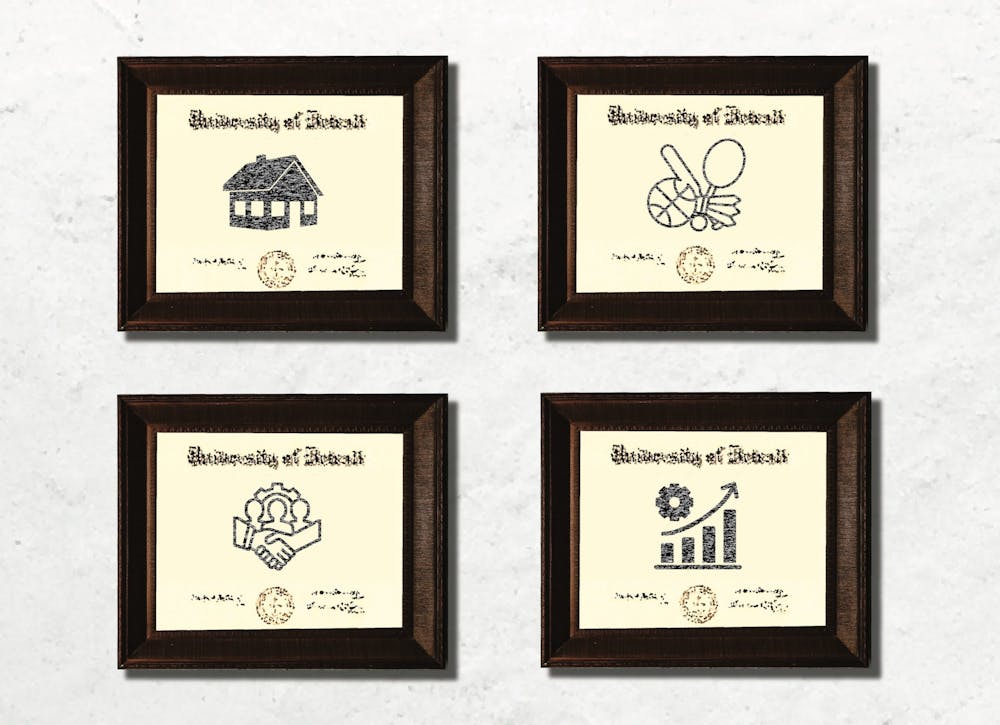Three weeks ago, the Ohio Department of Education approved Miami University’s proposed degree in arts management and arts entrepreneurship.
Senior Abigail Solon reached out to the College of Creative Arts almost immediately after the program was approved to add it as her second major. Before this summer, the only arts management program at Miami was a co-major.
“[The department] didn’t declare that there was going to be an actual major until this past summer,” Solon said. “So when they did, I immediately emailed Todd [Stuart, the director], and was like, ‘I really want to do that.’”
Arts management and arts entrepreneurship is just one of many undergraduate and graduate programs that have been recently approved or are in development at Miami.
Michael Crowder, associate provost and dean of the graduate school said most programs face a two-year process between conception and welcoming their first students. Some programs take longer to develop, like the athletic training graduate program, which has been in development since 2015.
“[Approving a major] is a bunch of steps, and it takes forever,” Crowder said. “ … At every university, it’s a similar timeline. Actually, we could be a little bit faster than most universities in getting new programs started.”
At Miami, new programs start as ideas from faculty members. The first step on the ladder of approval is a vetting process where a committee looks into student demand, job opportunities and similar majors at other universities in the state and nation.
Only after the committee considers the program and makes suggestions can faculty members move into drafting a program proposal.
Eric Brooks, director of Miami’s athletic training program, drafted the first proposal for a new master’s program to replace the undergraduate degree in 2017, but the master’s in athletic training won’t welcome its first graduate until 2022.
“We develop a proposal, and then we submit it to our department … and it works up a pretty logical ladder,” Brooks said.
After the first proposal for a new program is done, it gets sent to the dean of the academic college that will potentially house the degree. Crowder said they look into learning outcomes, whether a student’s education can be accurately assessed and what resources the university has to make the program a reality.
“It is really scrutinized very heavily at the divisional level because at the end of the day, the divisional dean has got to be the one that provides some, if not all, of the resources to offer the program,” Crowder said.
Enjoy what you're reading?
Signup for our newsletter
For master’s programs like athletic training, the next step is to get the Graduate Council’s approval. Undergraduate programs go to the Council for Undergraduate Curriculum. If the council raises concerns, programs go back to the drafting stage and start again.
“It does often loop around a few times,” Crowder said. “That’s why I think it’s really important to involve the grad school early on because maybe it could reduce, if not, eliminate the loop around.”
Programs are then sent to the Council of Academic Deans, where the six deans of Miami’s academic colleges can discuss whether the proposed program is similar to something the university already offers. Then it’s off to University Senate, and the last step before Miami sends the program to the state for approval is the Board of Trustees.
At its February meeting, the Board approved six new programs including a Bachelor of Science in hospitality management, Master of Science in Kinesiology, Nutrition and Health, Master of E-sports Management and a Master of Medical Science for physicians’ associates.
The Board also screens new focuses within existing programs. At the same meeting, it approved a management focus in the Master of Sports Leadership and Management (SLAM).
Robin Vealey, professor and director of graduate studies in SLAM, said Miami has attracted graduates interested in sports psychology since the 1980s, but the new focus will serve students interested in a broader range of sports-related careers.
“It’s traditionally been probably three-fourths of the students in the program have been interested in sports psychology,” Vealey said. “But with the new program and the emphasis on sport management, that’s slowly changing.”
After the Board of Trustees signs off, the program heads to the state where it’s scrutinized by deans from other colleges and universities before they make a recommendation to the Department of Higher Education Chancellor who has final say.
Crowder said the process means experts in the field of the proposed major at every university have a chance to critique the new program. For universities struggling with enrollment, it’s in their best interest to find flaws and stop a competitor program from developing.
“If we propose something … man, our program better be unique,” Crowder said. “It better have something that none of the other programs have so we can actually find a place in that very busy market.”




